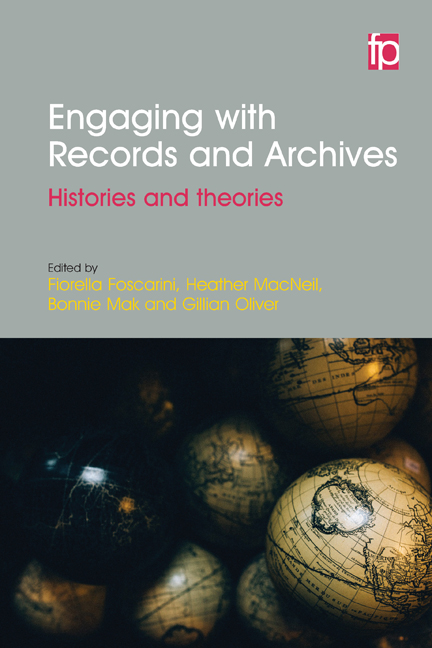Book contents
- Frontmatter
- Frontmatter
- Editors and contributors
- Editors’ introduction
- PART 1 RETHINKING HISTORIES AND THEORIES
- 1 Moving the margins to the middle: reconciling ‘the archive’ with the archives
- 2 Organisms, skeletons and the archivist as palaeontologist: metaphors of archival order and reconstruction in context
- 3 ‘Records in context’ in context: a brief history of data modelling for archival description
- 4 Mapping archival silence: technology and the historical record
- 5 Hidden voices in the archives: pioneering women archivists in early 20th-century England
- PART 2 ENGAGING RECORDS AND ARCHIVES
- Index
1 - Moving the margins to the middle: reconciling ‘the archive’ with the archives
from PART 1 - RETHINKING HISTORIES AND THEORIES
Published online by Cambridge University Press: 08 June 2018
- Frontmatter
- Frontmatter
- Editors and contributors
- Editors’ introduction
- PART 1 RETHINKING HISTORIES AND THEORIES
- 1 Moving the margins to the middle: reconciling ‘the archive’ with the archives
- 2 Organisms, skeletons and the archivist as palaeontologist: metaphors of archival order and reconstruction in context
- 3 ‘Records in context’ in context: a brief history of data modelling for archival description
- 4 Mapping archival silence: technology and the historical record
- 5 Hidden voices in the archives: pioneering women archivists in early 20th-century England
- PART 2 ENGAGING RECORDS AND ARCHIVES
- Index
Summary
THE EMERGENCE OF the ‘archive’ in the late 20th century as a focus of academic enquiry has given rise to a variety of responses from the archival profession. Rejection, indignation, speculation and even amusement have characterized the reactions of archivists to what has often seemed to them to be a misguided, misdirected, poorly understood and overly theorized construct of a primarily practical pursuit. Yet, academic fascination with the archive has lingered and in the early decades of the 21st century only grown stronger, so that the ‘archive’ now appears to be firmly established as a central identifier and research focus of many disciplines in the humanities and social sciences.
What each discipline means by ‘the archive’ or the ‘archival turn’ may differ slightly, but sufficient commonalities suggest a general understanding that ‘the archive’ – in both the digital and analogue realms – is recognized as an essential knowledge space to be approached, constructed and even confronted in numerous ways and from many perspectives. Environmentalist/ historian William Turkel (2007, 66) expresses this broad understanding when he claims that ‘every place is an archive, one that bears material traces of the past in the very substance of the past’, but this is not a view that archivists or the archival profession have traditionally embraced.
How have archivists responded to the challenges to their traditional theories and practices posed by the theorized ‘archive’? Archivists often seem reluctant to stray too far beyond their comfort zones, frequently emphasizing the differences between ‘the archive’ as conceptualized by non-archivists, and ‘real’ archival practice. Interrogating the commonalities between both, however, suggests that, for archivists, embracing ‘the archive’ in all its diversity and latitude could open valuable pathways towards a more inclusive and all-encompassing understanding of the variety of records that communities create and the many ways in which they tell their stories.
This essay attempts this interrogation, investigating developing multidisciplinary concepts of ‘the archive’ as well as their divergence from and impact on traditional archival theory and practice. It proposes to identify and map evolving concepts of ‘the archive’, seeking to reconcile them with traditional archival theory while exploring ways in which archival theorizing from other disciplines could expand archival thinking by archivists, and to some extent already has done so.
- Type
- Chapter
- Information
- Engaging with Records and ArchivesHistories and Theories, pp. 3 - 20Publisher: FacetPrint publication year: 2016
- 2
- Cited by



